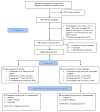Comparison of community health worker-led diabetes medication decision-making support for low-income Latino and African American adults with diabetes using e-health tools versus print materials: a randomized, controlled trial
- PMID: 25402398
- PMCID: PMC4391371
- DOI: 10.7326/M13-3012
Comparison of community health worker-led diabetes medication decision-making support for low-income Latino and African American adults with diabetes using e-health tools versus print materials: a randomized, controlled trial
Abstract
Background: Health care centers serving low-income communities have scarce resources to support medication decision making among patients with poorly controlled diabetes.
Objective: To compare outcomes between community health worker use of a tailored, interactive, Web-based, tablet computer-delivered tool (iDecide) and use of print educational materials.
Design: Randomized, 2-group trial conducted from 2011 to 2013 (ClinicalTrials.gov: NCT01427660).
Setting: Community health center in Detroit, Michigan, serving a Latino and African American low-income population.
Participants: 188 adults with a hemoglobin A1c value greater than 7.5% (55%) or those who reported questions, concerns, or difficulty taking diabetes medications.
Intervention: Participants were randomly assigned to receive a 1- to 2-hour session with a community health worker who used iDecide or printed educational materials and 2 follow-up calls.
Measurements: Primary outcomes were changes in knowledge about antihyperglycemic medications, patient-reported medication decisional conflict, and satisfaction with antihyperglycemic medication information. Also examined were changes in diabetes distress, self-efficacy, medication adherence, and hemoglobin A1c values.
Results: Ninety-four percent of participants completed 3-month follow-up. Both groups improved across most measures. iDecide participants reported greater improvements in satisfaction with medication information (helpfulness, P = 0.007; clarity, P = 0.03) and in diabetes distress compared with the print materials group (P < 0.001). The other outcomes did not differ between the groups.
Limitations: The study was conducted at 1 health center during a short period. The community health workers were experienced in behavioral counseling, thereby possibly mitigating the need for additional support tools.
Conclusion: Most outcomes were similarly improved among participants receiving both types of decision-making support for diabetes medication. Longer-term evaluations are necessary to determine whether the greater improvements in satisfaction with medication information and diabetes distress achieved in the iDecide group at 3 months translate into better longer-term diabetes outcomes.
Primary funding source: Agency for Healthcare Research and Quality and National Institute of Diabetes and Digestive and Kidney Diseases.
Conflict of interest statement
The authors have no conflict of interest or financial disclosures.
References
-
- Smedley A, Stith AY, Nelson AR. Unequal treatment: Confronting racial and ethnic disparities in health care. National Academy Press; 2002. - PubMed
Publication types
MeSH terms
Substances
Associated data
Grants and funding
LinkOut - more resources
Full Text Sources
Other Literature Sources
Medical

